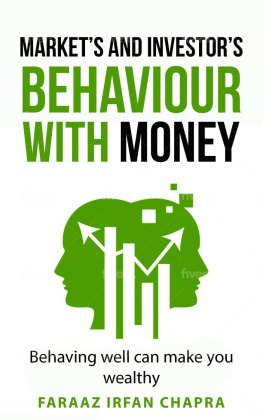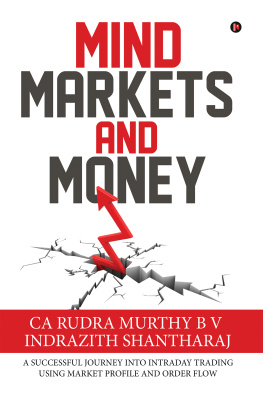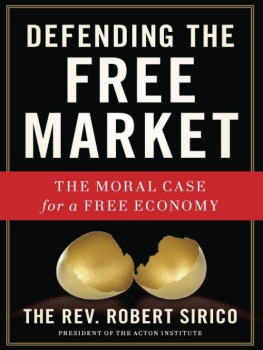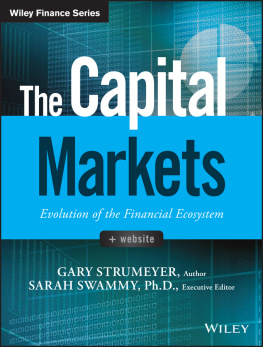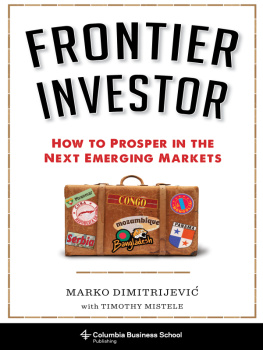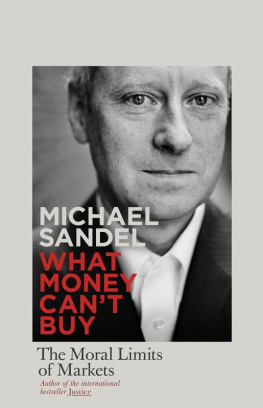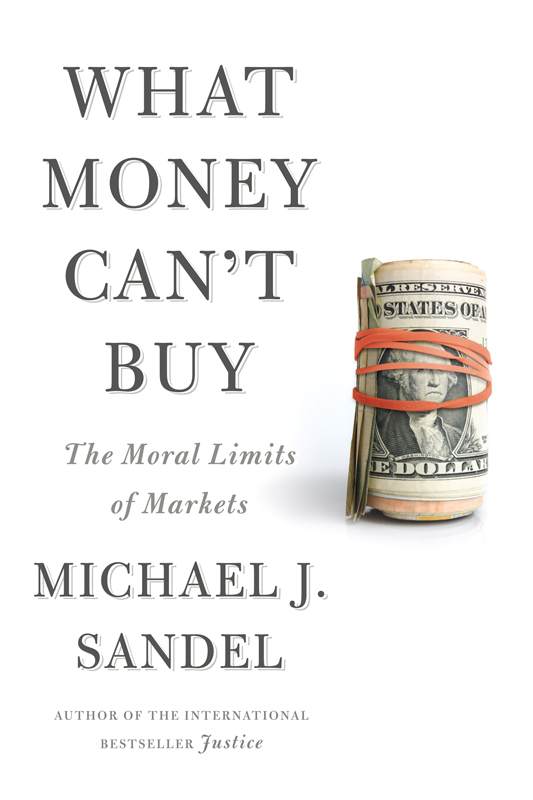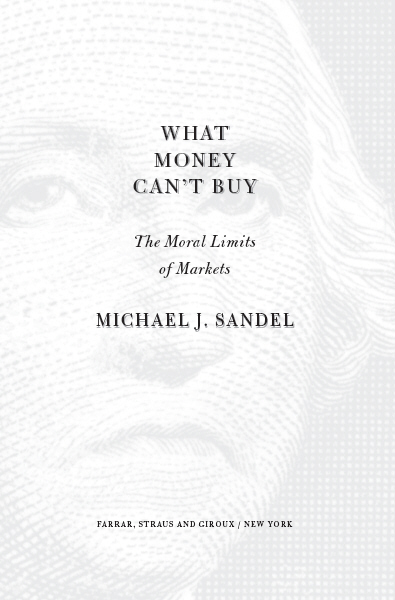
For Kiku, with love
Contents
Market Triumphalism Everything for Sale The Role of Markets Our Rancorous Politics
Airports, Amusement Parks, Car Pool Lanes Hired Line Standers Ticket Scalpers Concierge Doctors Markets Versus Queues Yosemite Campsites Papal Masses Springsteen Concerts
Cash for Sterilization The Economic Approach to Life Paying Kids for Good Grades Bribes to Lose Weight Selling the Right to Immigrate A Market in Refugees Speeding Tickets and Subway Cheats Tradable Procreation Permits Tradable Pollution Permits Carbon Offsets Paying to Kill an Endangered Rhino Ethics and Economics
Hired Friends Bought Apologies and Wedding Toasts The Case Against Gifts Auctioning College Admission Coercion and Corruption Nuclear Waste Sites Donation Days and Day-Care Pickups Blood for Sale Economizing Love
Janitors Insurance Betting on Death Internet Death Pools Insurance Versus Gambling The Terrorism Futures Market The Lives of Strangers Death Bonds
Autographs for Sale Corporate-Sponsored Home Runs Luxury Skyboxes Moneyball Bathroom Advertising Ads in Books Body Billboards Branding the Public Square Branded Lifeguards and Nature Trails Police Cars and Fire Hydrants Commercials in the Classroom Ads in Jails The Skyboxification of Everyday Life
Introduction: Markets and Morals
There are some things money cant buy, but these days, not many. Today, almost everything is up for sale. Here are a few examples:
A prison cell upgrade: $82 per night. In Santa Ana, California, and some other cities, nonviolent offenders can pay for better accommodationsa clean, quiet jail cell, away from the cells for nonpaying prisoners.
Access to the car pool lane while driving solo: $8 during rush hour. Minneapolis and other cities are trying to ease traffic congestion by letting solo drivers pay to drive in car pool lanes, at rates that vary according to traffic.
The services of an Indian surrogate mother to carry a pregnancy: $6,250. Western couples seeking surrogates increasingly outsource the job to India, where the practice is legal and the price is less than one-third the going rate in the United States.
The right to immigrate to the United States: $500,000. Foreigners who invest $500,000 and create at least ten jobs in an area of high unemployment are eligible for a green card that entitles them to permanent residency.
The right to shoot an endangered black rhino: $150,000. South Africa has begun letting ranchers sell hunters the right to kill a limited number of rhinos, to give the ranchers an incentive to raise and protect the endangered species.
The cell phone number of your doctor: $1,500 and up per year. A growing number of concierge doctors offer cell phone access and same-day appointments for patients willing to pay annual fees ranging from $1,500 to $25,000.
The right to emit a metric ton of carbon into the atmosphere: 13 (about $18) . The European Union runs a carbon emissions market that enables companies to buy and sell the right to pollute.
Admission of your child to a prestigious university: ? Although the price is not posted, officials from some top universities told The Wall Street Journal that they accept some less than stellar students whose parents are wealthy and likely to make substantial financial contributions.
Not everyone can afford to buy these things. But today there are lots of new ways to make money. If you need to earn some extra cash, here are some novel possibilities:
Rent out space on your forehead (or elsewhere on your body) to display commercial advertising: $777. Air New Zealand hired thirty people to shave their heads and wear temporary tattoos with the slogan Need a change? Head down to New Zealand.
Serve as a human guinea pig in a drug safety trial for a pharmaceutical company: $7,500. The pay can be higher or lower, depending on the invasiveness of the procedure used to test the drugs effect, and the discomfort involved.
Fight in Somalia or Afghanistan for a private military company: $250 per month to $1,000 per day. The pay varies according to qualifications, experience, and nationality.
Stand in line overnight on Capitol Hill to hold a place for a lobbyist who wants to attend a congressional hearing: $15$20 per hour. The lobbyists pay line-standing companies, who hire homeless people and others to queue up.
If you are a second grader in an underachieving Dallas school, read a book: $2. To encourage reading, the schools pay kids for each book they read.
If you are obese, lose fourteen pounds in four months: $378. Companies and health insurers offer financial incentives for weight loss and other kinds of healthy behavior.
Buy the life insurance policy of an ailing or elderly person, pay the annual premiums while the person is alive, and then collect the death benefit when he or she dies: potentially, millions (depending on the policy). This form of betting on the lives of strangers has become a $30 billion industry. The sooner the stranger dies, the more the investor makes.
We live at a time when almost everything can be bought and sold. Over the past three decades, marketsand market valueshave come to govern our lives as never before. We did not arrive at this condition through any deliberate choice. It is almost as if it came upon us.
As the cold war ended, markets and market thinking enjoyed unrivaled prestige, understandably so. No other mechanism for organizing the production and distribution of goods had proved as successful at generating affluence and prosperity. And yet, even as growing numbers of countries around the world embraced market mechanisms in the operation of their economies, something else was happening. Market values were coming to play a greater and greater role in social life. Economics was becoming an imperial domain. Today, the logic of buying and selling no longer applies to material goods alone but increasingly governs the whole of life. It is time to ask whether we want to live this way.
THE ERA OF MARKET TRIUMPHALISM
The years leading up to the financial crisis of 2008 were a heady time of market faith and deregulationan era of market triumphalism. The era began in the early 1980s, when Ronald Reagan and Margaret Thatcher proclaimed their conviction that markets, not government, held the key to prosperity and freedom. And it continued in the 1990s, with the market-friendly liberalism of Bill Clinton and Tony Blair, who moderated but consolidated the faith that markets are the primary means for achieving the public good.
Today, that faith is in doubt. The era of market triumphalism has come to an end. The financial crisis did more than cast doubt on the ability of markets to allocate risk efficiently. It also prompted a widespread sense that markets have become detached from morals and that we need somehow to reconnect them. But its not obvious what this would mean, or how we should go about it.
Some say the moral failing at the heart of market triumphalism was greed, which led to irresponsible risk taking. The solution, according to this view, is to rein in greed, insist on greater integrity and responsibility among bankers and Wall Street executives, and enact sensible regulations to prevent a similar crisis from happening again.
This is, at best, a partial diagnosis. While it is certainly true that greed played a role in the financial crisis, something bigger is at stake. The most fateful change that unfolded during the past three decades was not an increase in greed. It was the expansion of markets, and of market values, into spheres of life where they dont belong.


